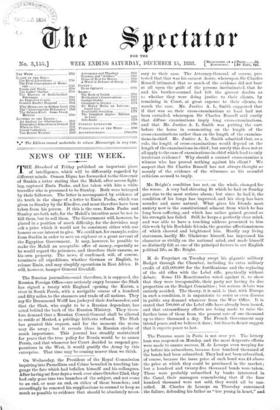On Wednesday, the President of the Royal Commission inquiring into
Parnellism and Crime bewailed in touching lan- guage the fate which had befallen himself and his colleagues. After having sat four days a week ever since October 22nd, they had only gone into two branches of the subject, and not come to an end, or near an end, on either of these branches; and accordingly he renewed his supplications to counsel to keep as much as possible to evidence that should be absolutely neces-
sary to their case. The Attorney-General, of course, pro- tested that that was his earnest desire, whereupon Sir Charles Russell intimated that so much of the evidence did not bear at all upon the guilt of the persons incriminated, that he and his brother-counsel had felt the gravest doubts as to whether they were doing justice to their clients, by remaining in Court, at great expense to their clients, to watch the case. Mr. Justice A. L. Smith suggested that if that was so, their cross-examinations at least had not been curtailed, whereupon Sir Charles Russell said curtly that diffuse examinations imply long cross-examinations, and that Mr. Justice A. L. Smith was putting the cart before the horse in commenting on the length of the cross-examinations rather than on the length of the examina- tions-in-chief. Mr. Justice A. L. Smith admitted that, as a rule, the length of cross-examinations would depend on the length of the examinations-in-chief ; but surely this does not at all apply to the case of examinations-in-chief which lead to only irrelevant evidence ? Why should a counsel cross-examine a witness who has proved nothing against his client ? We suspect that Sir Charles Russell has not always thought so meanly of the evidence of the witnesses as his scornful criticism seemed to imply.














































